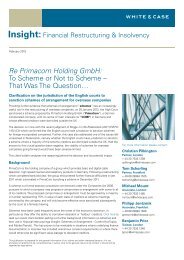Mexican Legal Framework of Business Insolvency - White & Case
Mexican Legal Framework of Business Insolvency - White & Case
Mexican Legal Framework of Business Insolvency - White & Case
Create successful ePaper yourself
Turn your PDF publications into a flip-book with our unique Google optimized e-Paper software.
68<br />
q. Post-Commencement Financing<br />
The <strong>Insolvency</strong> Law provides a very poor framework for post-commencement<br />
financing. The debtor is entitled to obtain secured or unsecured post-commencement<br />
financing with the approval <strong>of</strong> the conciliator [LCM 75]. When the debtor obtains<br />
post-commencement financing for the management and operation <strong>of</strong> the estate, such<br />
financing will be considered a claim against the estate (cfr. 16.c) [LCM 224-II, III].<br />
Post-commencement financing does not necessarily have to be obtained in the ordinary<br />
course <strong>of</strong> business, but will require conciliator approval if outside the ordinary course<br />
<strong>of</strong> business. Weil (2000) 46 provides an excellent illustration <strong>of</strong> the ordinary course <strong>of</strong><br />
business issue in the context <strong>of</strong> post-commencement financing:<br />
[T]he determination as to what constitutes a transaction in the ordinary course <strong>of</strong><br />
the debtor’s business is fact-specific and must be made on a case-by-case basis.<br />
For example, trade credit obtained by a debtor in possession in connection with the dayto-day<br />
operation <strong>of</strong> its business generally constitutes an ordinary course <strong>of</strong> business<br />
transaction. Monies advanced by the lender to fund the debtor’s payroll and operating<br />
expenses typically are not regarded as credit obtained in the ordinary course <strong>of</strong> business.<br />
While en concurso, the debtor is protected from the suspension <strong>of</strong> payments <strong>of</strong> only<br />
its pre-petition debts, so the payment <strong>of</strong> post-petition debts is not suspended (cfr.<br />
15.g). This means that the debtor would not be found in contempt <strong>of</strong> court if it makes<br />
payments and repayments <strong>of</strong> post-petition debt. However, the stay <strong>of</strong> execution<br />
imposed by the concurso declaration applies broadly during the conciliation (cfr.<br />
15.h), so a creditor will still encounter hurdles to collect a post-petition credit during<br />
conciliation in the absence <strong>of</strong> the debtor’s cooperation.<br />
ALI Nafta (2003) argues that the legal and regulatory regime applicable to <strong>Mexican</strong><br />
commercial banks makes post-commencement financing “extremely rare” in Mexico. 47<br />
46 P. 200.<br />
47<br />
See Reporters’ Note 8, pp. 106-108.
















